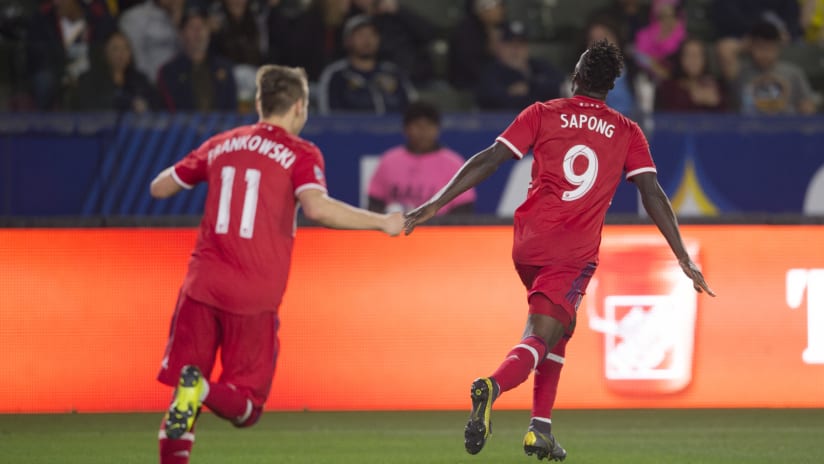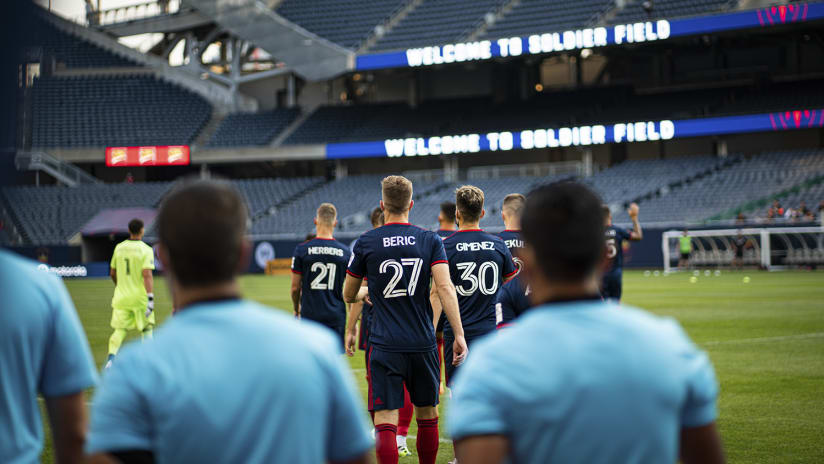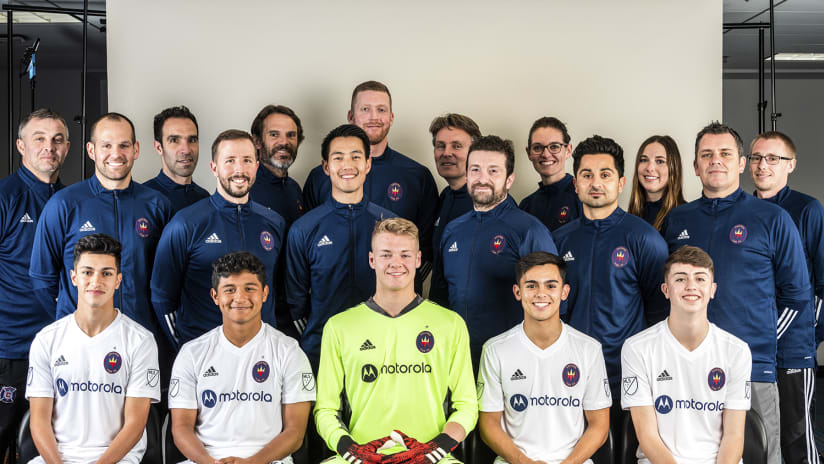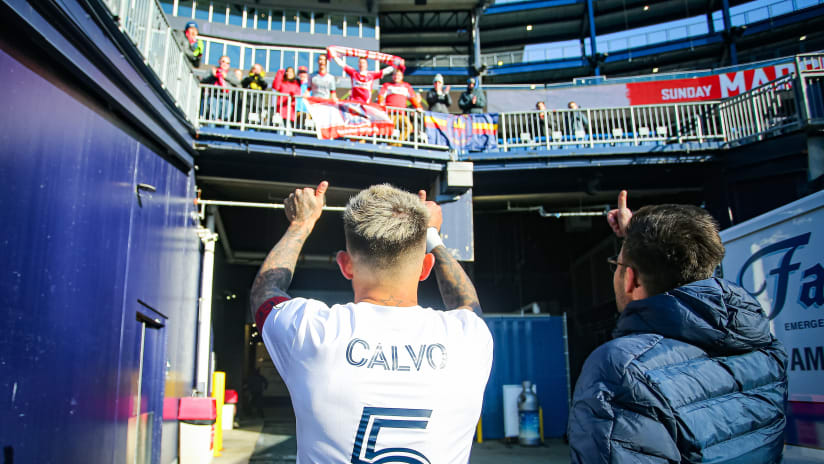As a national soccer writer, Graham Parker has covered US soccer culture for The New York Times, The Guardian, ESPN, The Wall Street Journal, Grantland, Al Jazeera America, Vice, FourFourTwo, Howler and numerous other print, web, tv and radio outlets in the U.S. and Europe. He has attended World Cup finals and games where the teams outnumber spectators. Now Graham has joined the Chicago Fire as Senior Director, Strategy and Special Projects, to help write the next chapter in our story.
--
By the end of his first week working for the Chicago Fire, CJ Sapong had gone straight into the team and scored his first goal for the club. By the end of my first week working for the Chicago Fire I was reasonably happy to have worked out how to connect to the office printer network…
Professional athletes are different.
And they’re the same. As it turned out, I ran into CJ a few times over the course of the week.
We had our orientation tours at the club on the same morning (he got the louder round of applause in the office…) and both wound up crowding into Club President Nelson Rodriguez’s office at the same time for our formal welcome to the club. Later that day we’d find ourselves sitting backstage at the Season Kickoff Gala for the Chicago Fire Foundation, comparing notes on our first day. When we parted, CJ gamely went out to join the table of kids he’d been seated at as a last-minute arrival, and I circulated throughout the room, occasionally noticing him happily entertaining his charges for the rest of the evening.
Throughout that first week, we and all the other new players and personnel at the club were doing the same human thing — processing our feelings about a rapid transition and a new environment, while trying to hit the ground running. Trying to bring our professional experience and skillset to match new roles and new colleagues, while learning some of the technical shorthand and social cues of this club in particular. For me, a natural watcher, a lot of that was about observing and reacting — feeling out the space and figuring out ways to usefully support.
But footballers, and maybe strikers in particular, don’t have that kind of luxury. Their learning curve is immediate and public — and the stresses to perform unique. So how do they and the club manage those transitions, so that the final move to round the keeper on your opening game feels as natural as breathing?
The clue to that went back to that first meeting in Nelson’s office, where CJ was guided into the room by Alex Boler. Officially, Alex is the Senior Manager of Team and Soccer Operations at the club. That dry-sounding title conceals the fact that Alex is there to help the humans that make up the team be able to leave their personal lives beyond the touchline and be the best players they can be. Among players around the league who have worked with him, Alex has a reputation as being one of the best at what he does. He’s what CJ calls “one of those deeper-rooted gems within organizations…fans maybe don’t know about that position and it doesn’t get lauded on social media or whatever, but you’re not going to get a winning product unless in some way, shape or form the players are comfortable, taken care of.”
That process starts while the ink is still wet on the paperwork. As Alex puts it, “I’m the second person to call the player. Often, I’m sitting next to Nelson and Pauno [Veljko Paunovic] when they make the initial call to give their speech — they welcome them to the club, Pauno talks about the mindset of the team, and so on. And then either I’m there to call straight away or Nelson texts me with the green light.”
In CJ’s case, that call came shortly after coming off the field after his final pre-season training session with the Philadelphia Union. After registering the shock of being told he was being traded by his sporting director, he describes what he calls “a tornado of thoughts” and logistical questions:
“I wasn’t even thinking about myself so much as things I’d built in Philly with my non-profit, or what was I going to do with my dogs. Then my family had been close by in D.C. this past couple of years and they’d come to watch every game…”
That’s where Alex Boler comes in with the initial phone call:
“The thing I emphasize is, ‘Don’t worry about anything. My sole job is to make you feel happy and comfortable and to have no stress, and for us to win on the weekend and get three points.’ My job, in the end, is to make sure that they can just play soccer, and everything is going to be taken care of. ‘Shipping your stuff is going to be taken care of. Your car — we’re going to get that to Chicago. So, you don’t have to worry about that.’ We have a driver to meet them at baggage claim, take them to the hotel and to and from training, a real estate agent to take them round. All the details.’
It’s not a one-size fits all approach. Like any of us, players want to be seen as individuals. They are bringing their human qualities as well as their technical attributes to their lives in the city and however professional they might be, there is no such thing as a plug-and-play component when you’re integrating a person, in all their complexity, with a team. Playing the average game of FIFA Ultimate Team it can be easy to forget that that player with a 79 score in Passing Ability might also have a 95 score in Complicated Family Life. Alex’s pastoral care role is to keep those concerns to a minimum.
“You get a good sense in the initial phone call. I usually do some research beforehand. I try to get all the facts I can up front before I make the phone call just to make him feel a little more comfortable — that we know some stuff about him, that we care. Does he have family? Does he have kids? Do they need their family around immediately or do they need to feel they’ve taken care of everything in advance before they send for them? Where is he coming from? And on day one we sit down and we go through a plan for him.”
Still, while Alex will make it clear that he is “available 24/7. There are no stupid questions,” ultimately there’s still a moment when the player has met a sea of new faces, been driven to and from training and the door is closing for the night in a hotel room in a strange city and they’re left in their own company. I ask CJ what that moment was like for him:
“I tell you, it was a moment where I did give myself a little pat on the back for how I handled it, and how getting here was a testament to my personal growth this last four or five years. For context, my first three seasons in the league, I [won] Rookie of the Year my first year, an Open Cup championship the next year, an MLS Cup the next year. So, the accolades came fast. The city [Kansas City] was a soccer town — really appreciated the players. We were held to a high standard, we were regarded as elite individuals in the city. And I think looking back it came a little too fast for me, because it didn’t allow me to take care of the personal work that needs to be done when gravity shifts like that. It took a little bit of a…I guess you’d say, ‘a crash in the stock market’ for me to start digging deeper into myself and saying, ‘OK, although I play this sport that I live for a living, what truly defines me?’ And it was a struggle when I couldn’t even answer that. So, the next 4 or 5 years was a continuous revealing of what those things are.”
“Fast forward to that first night after the first full day — when I finally got back to that hotel I was like, ‘Wow, honestly I’m really grateful that [history] happened that way.’ The things I’ve started to do in the last two, three years off the field, and gaining fulfillment by other means beside the stat sheet, allowed me to become more of a complete person, and I think that’s translated into becoming more of a complete player. And now I could be here and be thankful and visualize the future, knowing what I bring.”
“So, when I got back into bed on that first night, all I was thinking about was the good things. You and I had had a great conversation at the gala, I had a good conversation with Jessica [Jessica Yavitz, Vice President of Community Relations and Executive Director, Chicago Fire Foundation]. Given I do stuff in the community as well, it was good to talk to her. I could feel the guys warming up a bit. And to be fair I was in a nice comfortable bed, in a pretty nice part of Chicago. I got to see some scenery on the way in, and it was a very alive moment. The blood was pumping and the excitement was moving through me. There is some power in having faith that things will be OK.”
Talking to both men, and other players and staff around the club, it becomes clear that some of that faith comes from the journey CJ himself has been on, and some of it comes because day-to-day concerns don’t become debilitating ones for players on Alex Boler’s watch.
And of course, faith without actions is dead. But a few days later CJ was on a field on the other side of the country, set up to be ready to do the job he’s always done, waiting for his moment and believing he’d take the chance when it came. He did. But the goal started long before the intercepted pass.
##





